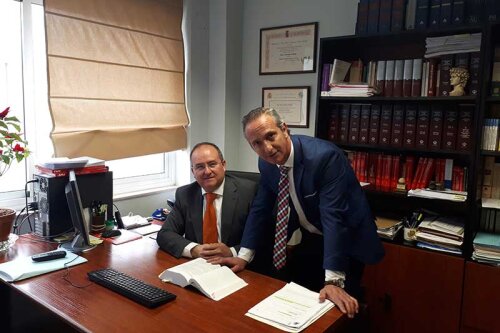Best Housing, Construction & Development Lawyers in Cáceres
Share your needs with us, get contacted by law firms.
Free. Takes 2 min.
Free Guide to Hiring a Real Estate Lawyer
List of the best lawyers in Cáceres, Spain
About Housing, Construction & Development Law in Cáceres, Spain
Housing, construction, and development law in Cáceres, Spain, governs how properties are built, bought, sold, and maintained within the province. These laws are influenced both by national Spanish statutes and regional or local regulations that ensure compliance with urban planning, safety standards, zoning, and environmental impact. For residents and developers in Cáceres, understanding these laws is essential for making informed decisions about buying property, developing land, or resolving disputes related to housing and construction.
Why You May Need a Lawyer
There are several situations where a lawyer specializing in housing, construction, and development law can provide valuable assistance in Cáceres:
- Buying or selling residential or commercial property
- Dealing with construction contracts or disputes with builders or contractors
- Seeking permits or navigating urban planning regulations
- Resolving boundary or title disputes
- Handling issues related to rental properties, including leases and tenant rights
- Challenging property tax assessments or handling inheritance of real estate
- Pursuing claims for defective construction or delays in completion
A lawyer can ensure compliance with all legal requirements, help avoid costly mistakes, and offer representation in negotiations or court proceedings as needed.
Local Laws Overview
Cáceres, as part of the Extremadura region, adheres to both national Spanish property laws and local building regulations. Key aspects include:
- Urban Planning: The Plan General Municipal (PGM) sets out land use and approved development areas. Any construction or modification requires adherence to the PGM and municipal ordinances.
- Building Permits: Approval from the local Ayuntamiento (city or town hall) is mandatory before beginning any major construction or renovation.
- Property Registration: All property transactions must be registered at the Registro de la Propiedad (Property Registry) to be legally valid.
- Energy and Safety Regulations: New buildings must meet energy efficiency requirements and safety codes, with certificates often required before sale or occupancy.
- Environmental Restrictions: Protected areas, such as those around historical sites or nature reserves, have additional limitations on development.
- Rent Laws: Rental agreements are governed by the Ley de Arrendamientos Urbanos and can be subject to updates, so it is important to stay informed of the latest legal requirements.
Frequently Asked Questions
What documents are needed to buy property in Cáceres?
You will need your identification (NIE or passport), proof of funds, the title deed (escritura), a recent property registry certificate, and proof of payment of local taxes. A lawyer can help you compile and review all necessary documents.
How do I obtain a building permit?
Applications are made to the local Ayuntamiento. You will need architectural plans, proof of ownership, environmental assessments if applicable, and payment of municipal taxes or fees. Approval is required prior to any work starting.
Can foreigners purchase property in Cáceres?
Yes, non-Spanish citizens can buy property in Cáceres. It is essential to obtain a NIE (foreigner identification number) and comply with the same legal procedures as residents.
What rights do tenants and landlords have?
Both parties have rights protected under national and local law. For example, landlords can stipulate contract terms but must respect duration and notice requirements. Tenants have rights to proper maintenance and quiet enjoyment of the property.
What happens if construction work is defective?
Under Spanish law, builders are responsible for structural defects for a period of up to ten years. Your lawyer can help you make a defect claim or negotiate repairs or compensation.
How is land use determined in Cáceres?
Land use is regulated by the Plan General Municipal and supplementary municipal regulations. This determines what type of development is allowed and where, including residential, commercial, or industrial use.
Are there taxes involved in property transactions?
Yes, buyers typically pay the Impuesto de Transmisiones Patrimoniales (transfer tax) for resale properties or IVA (VAT) on new developments. Sellers may be liable for capital gains tax. Both buyers and sellers may have to pay notary and registry fees.
What is the process for legalizing existing but unregistered property?
Legalization involves providing proof of ownership, ensuring the building complies with planning regulations, paying required taxes, and registering the property with the Registro de la Propiedad.
Who is responsible for maintaining community spaces in apartment blocks?
Maintenance is managed and paid for by the community of property owners in line with the statutes of the Comunidad de Propietarios. Regular meetings and budgets are established for shared expenses.
What should I do if I have a boundary dispute with a neighbor?
Boundary disputes should first be addressed with your neighbor. If not resolved, legal action may be required. A lawyer can assist in mediation, interpretation of registry documents, and court proceedings if needed.
Additional Resources
Several local and national organizations and governmental offices offer support and information for housing, construction, and development matters in Cáceres:
- Ayuntamiento de Cáceres (City Hall) - For permits, urban planning, and tax information
- Registro de la Propiedad (Property Registry) - For property registration and title information
- Colegio de Abogados de Cáceres (Bar Association) - For finding qualified local lawyers
- Junta de Extremadura - Department of Housing and Urbanism, for regulations and programs
- Oficina Municipal de Información al Consumidor (Municipal Consumer Information Office) - For guidance on disputes with builders or landlords
Next Steps
If you require legal assistance in housing, construction, or development matters in Cáceres, consider the following steps:
- Gather all available documentation related to your issue, such as contracts, permits, or property titles
- Make notes about the situation, including key dates and parties involved
- Contact a local lawyer specializing in housing and construction law for an initial consultation
- Consult official sources or the relevant municipal offices for information about specific permits or procedures
- Prepare your questions ahead of any legal meeting to ensure all your concerns are addressed
Taking these steps will help you navigate the legal requirements effectively and protect your interests in any housing, construction, or property development transaction in Cáceres.
Lawzana helps you find the best lawyers and law firms in Cáceres through a curated and pre-screened list of qualified legal professionals. Our platform offers rankings and detailed profiles of attorneys and law firms, allowing you to compare based on practice areas, including Housing, Construction & Development, experience, and client feedback.
Each profile includes a description of the firm's areas of practice, client reviews, team members and partners, year of establishment, spoken languages, office locations, contact information, social media presence, and any published articles or resources. Most firms on our platform speak English and are experienced in both local and international legal matters.
Get a quote from top-rated law firms in Cáceres, Spain — quickly, securely, and without unnecessary hassle.
Disclaimer:
The information provided on this page is for general informational purposes only and does not constitute legal advice. While we strive to ensure the accuracy and relevance of the content, legal information may change over time, and interpretations of the law can vary. You should always consult with a qualified legal professional for advice specific to your situation.
We disclaim all liability for actions taken or not taken based on the content of this page. If you believe any information is incorrect or outdated, please contact us, and we will review and update it where appropriate.









